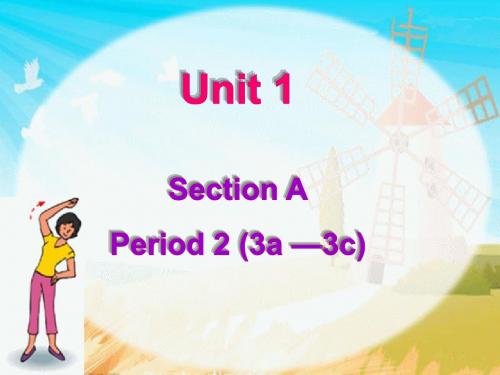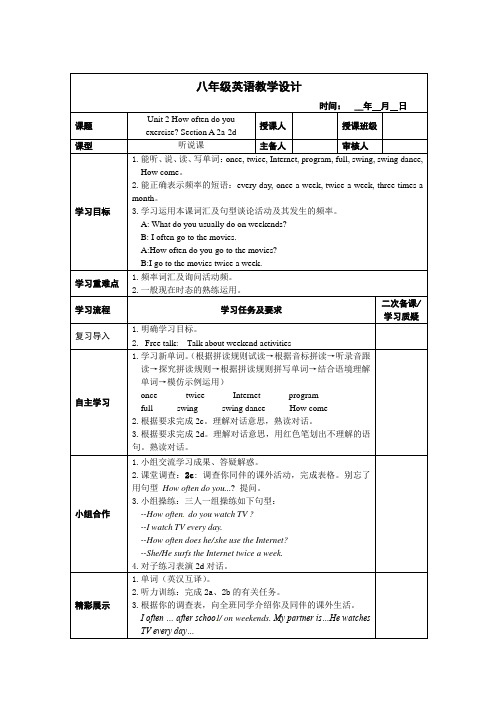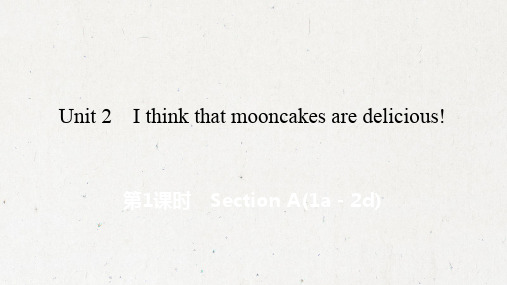Section A-2
Unit2SectionA1a-2d课件人教版七年级英语上册

/ðɪs/
These are Peppa's_b__ro_t_h_e_r_s_.
/ðiːz/
兄弟们
That is Peppa's__fr_i_e_n_d_(_朋__友__)__.
/ðæt/
Those are Peppa's__f_r_ie_n_d__s_.
/ðəʊz/
朋友们
Match the words with the people in
A: And what’s her name?
B: Her name is …
Gina
Jenny
Mary
Jim
Alan
IIssIshhheeeDCLehunegnHCHanhe?ao? YNYeoes,s,h,heheeisiisns.'.t.
Is he …? Yes, he is. No, he is not (he isn’t).
1. mother
a
the picture.
2. father
c
3. parents
b
4. brothers
h
5. grandmother f
e
6. grandfather
i
7. friend
d
8. grandparents
g
9. sister
Listen and circle the words you hear in 1a. 1. mother 2. father 3. parents 4. brothers 5. grandmother 6. grandfather 7. friend 8. grandparents 9. sister
Section A-2

注意: 感官动词 see, watch, observe, notice, hear, look at, listen to, smell, taste, feel +doing 表示 动作的连续性、进行性 感官动词 see, watch, observe, notice, hear, look at, listen to, smell, taste, feel + do 表示动 作的完整性、真实性 I saw him work in the garden yesterday. 昨天我看见他在花园里干活了。 (强调"我看见了"这个事实)
You shouldn't ___________. exercise
What’s the matter? fever I have a _________. drink lots of water and go You should________________________. to bed go out and exercise You shouldn't_____________________.
when常常用来引导时间状语从句,当放在 过去进行时构成的主句之后时,表示主句 动作发生的过程中,另一个意想不到的动 作发生了。 I was thinking of this when I heard my name called. 我正想着这件事时,突然听到有人叫我 的名字。 We were playing outside when it began to rain. 我们正在外边玩,这时下起雨来了。
What’s the matter? I have a _____________. sore throat You should _________________________, drink some hot tea with honey or __________________. go to see the doctor You shouldn't ___________________________ eat dry food such as cookies or _______________. speak too loudly
人教版八年级上册 Unit 2 Section A(2a-2d) 教学设计

八年级英语教学设计时间: __年月日课题Unit 2 How often do youexercise? Section A 2a-2d授课人授课班级课型听说课主备人审核人学习目标1.能听、说、读、写单词:once, twice, Internet, program, full, swing, swing dance, How come。
2.能正确表示频率的短语:every day, once a week, twice a week, three times a month。
3.学习运用本课词汇及句型谈论活动及其发生的频率。
A: What do you usually do on weekends?B: I often go to the movies.A:How often do you go to the movies?B:I go to the movies twice a week.学习重难点1.频率词汇及询问活动频。
2.一般现在时态的熟练运用。
学习流程学习任务及要求二次备课/学习质疑复习导入1.明确学习目标。
2. Free talk: Talk about weekend activities自主学习1.学习新单词。
(根据拼读规则试读→根据音标拼读→听录音跟读→探究拼读规则→根据拼读规则拼写单词→结合语境理解单词→模仿示例运用)once______ twice______ Internet______ program______full_____ swing_____ swing dance_____ How come_____2.根据要求完成2c。
理解对话意思,熟读对话。
3.根据要求完成2d。
理解对话意思,用红色笔划出不理解的语句。
熟读对话。
小组合作1.小组交流学习成果、答疑解惑。
2.课堂调查:2c: 调查你同伴的课外活动,完成表格。
别忘了用句型How often do you...?提问。
人教版八年级英语上unit 2 sectionA 1a--2d教学设计教案

5.每星期三四次__________6.每月两次_________ 7.帮忙做家务_________8.钢琴课 _________
9.动物世界_________10.你最喜欢的节目 _________
(二)、根据需要填空:
1.The old man ____________(体育锻炼)every morning.
3.及时练,学生完成下面练习。
( )1.I like English very much,so I ______ listen to the tape in the morning.
uallyB.hardly everC.never
( )2.—What does your father do in the evening?
人教版八年级上Unit2sectionA教学设计
【课 题】
Unit 2 How often do you exerciseSection A 1a—2d
【学习目标】
1、熟记运用5个单词:housework、hardly、ever、once、twice
2、掌握2个句型① A: What do you usually do on weekends?
—He usually ____________.
A.watch TVB.exercisesC.read books
( )3.“____________give up,then you can be successful(成功) .”
A.AlwaysB.SometimesC.Never
( )4.I don't like milk but mother wants me _____.
Section A-2

3b Fill in the blanks in the e-mail message with the words in the box.
anything everything nothing everyone no one
Dear Bill, How was your vacation? Did you do anything ________ interesting? Did________ in the family go with everyone you? I went to a friend’s farm in the countryside with my family. everything _________was great.
一般过去时
1.定义: 1) 表示过去某个时间发生的动作或存在
的状态,常和表示过去的时间状语(如yesterday,
last night, in 1990, two days ago...)连用;
2) 也表示过去经常或反复发生的动作, 常和表示
频度的时间状语(如often, always…)连用。 有哪些时间状语可以用来描述过去?
eating anything at a restaurant? read anything interesting? Visit anyone in your family? Buy anything? Keep a diary?
Everyone Someone No one
In our group, everyone ate something at a restaurant
肯定句:主语+was (were) +宾语
如:I was late yesterday. 昨天我迟到了。 否定句:主语+was (were) +not+宾语 如:We weren't late yesterday. 我们昨天没迟到
人教版九年级上册英语课件:Unit 2 Section A(1a-2d)(共10张PPT)

第1课时 Section A(1a-2d)
名师点睛
•词汇冲 • 1.crowded adj.拥挤的。其反关义词为uncrowded(不拥挤的)。短语:
be crowded with挤满了…… • 2.【辨析】believe与believe in。believe表示相信某人的话,而
the races.比尔和玛丽都相信他们明年还会回来观看龙舟比赛。
• 该句包含一个that引导的宾语从句,作动词believe的宾语;在宾语从 句中,to watch the races为动词不定式短语,在句中作目的状语。 【拓展】动词不定式作目的状语既可放在主句前,也可放在主句后。 放在主句之前时,要用逗号与主句隔开。例:To get high grades, he works very hard.=He works very hard to get high grades.为 了取得高分,他努力地学习。
• 9.relative n.亲属;亲戚。【拓展】relative还可作形容词,意为
“相对的;有关系的”。 • 10.throw(threw,thrown)v.扔;掷。短语:throw...at...朝……
扔……,把……洒/抛在……上。throw后接所扔的东西,at后接扔的 对象。
•难句解 • Bill and Mary believe that读they'll be back next year to watch
ut
• 5.Don't eat too much, or you'll p_________ on your weight.
• 6.【2018·浙江杭州中考】The train was vreowrydecd_____________ with passengers, so we had to stand.
Section A-2

Can you hang out with us tonight? 3. Inviting: _______________________________ (can/ hang out with us tonight) Refusing: _______________________________ Sorry, I’m not free. I must study for a test. Reason: ____________________________(must) 4. Inviting: _______________________________ Would you like to come to my birthday party? (would like to/come to my ________________ birthday party) Sure. I’d love to. Accepting: _______________________________
c. She had to study for a math test yesterday.
Did she have to study for a math yesterday?
Yes, she did. She didn’t have to study for a math yesterday.
go to the doctor
go to the zoo
A: Can you go to the zoo? B: Sorry, I can’t. I have to help my parents. help my parents A: Can he go to the zoo? C: No, he can’t. He has to help his parents.
Section A-2

No, I don’t. I always ride my bike. ___________________________________
5. ride/their bikes/do/school/your friends/to Do your friends ride their bikes to school ___________________________________? Yes, they do. ___________________________________
--- ______ do you play football? --- Once a week. A. How much B. How long C. How often D. How far
答案:C 解析:本题是对疑问副词词组的考察, 通过答句可以判断出是询问动作发生的 频率,所以选择C。
Group work:
b. No, he doesn’t.
c. He rides his bike. d. It’s five kilometers. e. About 15 minutes.
3b
Use these words to make questions. Then ask and answer them with your partner.
1. school/you/get to/do/how ___________________________________? How do you get to school ___________________________________ I ride my bike. 2. to/school/get to/does/how long/take/it ___________________________________? How long does it take to get to school ___________________________________ It takes about five minutes.
- 1、下载文档前请自行甄别文档内容的完整性,平台不提供额外的编辑、内容补充、找答案等附加服务。
- 2、"仅部分预览"的文档,不可在线预览部分如存在完整性等问题,可反馈申请退款(可完整预览的文档不适用该条件!)。
- 3、如文档侵犯您的权益,请联系客服反馈,我们会尽快为您处理(人工客服工作时间:9:00-18:30)。
2. might/could (1) 分别为may和can的一般过去时,分别表示
过去的“许可”、“可能”和“能力” 、 “能够”等。
The children asked whether they could/might go for a swim.(过去许可)
I was afraid it might rain that afternoon. (过去可能)
Unit 9 Can you come to
my party?
Can she…
Can she come to the party?
Yes,she can.
Can he go to the baseball game?
No,he can’t. He has to
study.
Can he…
Can they come to the party?
否定句 This news may not be true. (也许不, =might not ) This news can’t be true. (不可能, =couldn’t) 疑问句 Can this news be true?(=Could) ≠May this news be true?
go to a party
Weekend Activities
go to the concert study for a test have a piano lesson
go to the doctor
visit his aunt go to a baseball game/ have baseball training
birthday party) __W__o_u_ld__y_o_u_l_i_k_e_t_o_c_o_m__e_t_o_m__y_b__ir_t_h_d_a_y_p__a_rty? Accepting:____S_u_r_e_,_I_’d__l_o_v_e_t_o_. ____________
3c Write down everything you have to do next week. Choose a day and time to have a party. Then invite classmates to your party.
A: Can you come to my party? B: When is it? A: Next week, on Thursday night. B: I’m sorry. I have to study for a math test.
Do you know week?
星期一
星期二 星期三 星期四 星期五 星期六 星期日
3b Complete the sentences below. Use the words in brackets to help you.
1. Inviting: (can / play tennis)
__C__a__n__y__o__u__c__o_m___e__t_o___p_l_a__y__t_e__n_n__i_s_?________ Accepting:__S_u_r_e_, _th_a_t__so_u__n_d_s_g_r_e_a_t.___ 2. Inviting: (would like to/ go to the movies) Reason: (might have to) _w__o_u_ld__y_o_u__li_k_e_t_o_g_o__to__t_h_e_m__o_v_ie_s_? Refusing : I’m afraid not. I have too much
Can she go to the baseball game?
No. she’s not available. She must go to the doctor.
Can they go to the movies?
No, they’re not free. They might have to meet their friends.
can为情态动词, 在本单元中表示请求, 用于发出邀请,后跟动词原形。当同意接 受对方的邀请时, 常用Sure, I’d love to. / Certainly. /Of course.等来回答;若不接受, 常用Sorry等来有礼貌地拒绝, 一般情况下 需要说明不能接受邀请的原因以表示歉意。
—Can you come to my birthday party tomorrow? 明天你来参加我的生日聚会,好吗?
____h_o_m_e_w__o_r_k_t_o_d_o_._____________ 3. Inviting: (can/hang out with us tonight)
Reason: (must) ___C_a_n__y_o_u__h_a_n_g_o_u_t__w_i_th__u_s_t_o_n_i_g_h_t?_____ Refusing: _N__o_, _I_c_a_n_’_t._I_m__u_s_t_f_in__is_h_m__y__h_o_m_ework. 4. Inviting: ( would like to / come to my
Can you go to the
Sure. That sounds great.
movies tomorrow night? I’m afraid not. I have the flu.
Can he go to the party? No, he can’t. He has to help his parents.
study for a test go to the doctor have a dancing lesson
ቤተ መጻሕፍቲ ባይዱ
Grammar focus
情态动词主要有:may/might, can/could, must, have to, shall/should, will/would, ought to, need, dare, used to。
/I’m sorry. I’d rather you didn’t. ② — Can I go out and play, Mum?
—Yes/Certainly, you can. /No, you can’t. ③ — Can you help me with this bag?
—With pleasure./Sorry, I can’t. (3) 都可表示“可能性”
B:__M__y__c_o_u_s_in__________________________ 5. A: Are you free to come to my place on
Saturday? B: _N__o_. _I_m__ig_h_t_v_i_s_it__g_ra_n__d_p_a_r_en__ts__. ________
What do you usually do on weekends? What activities do you do on weekends? What weekend activities do you do?
have to … 不得不
A: What do you have to do this weekend? B: I have to…
现在我们来着重学习情态动词can 以及 have to 的用法。 其特征主要有:
1. 不能独立作谓语,只能和动词原形一起构 成谓语,表示说话人的语气和情态。
2. 没有人称和数的变化。 (have to除外) 3. 否定形式:在其之后加not (have to除外)。
疑问形式:情态动词提到主语之前(have to 除外)。
—Sorry, I can’t. I am going to visit my grandpa. 很抱歉,我来不了,我要去看我爷爷。
1. can/may (1) 都可表示“许可” 。may用于较正式、客
气的场合,而can比较随便(口语)。 You may/can smoke here. ➢ Borrowers may not take out of the
3a Complete the answers with might and one of the phrases in the box.
watch TV on the weekend my cousin visit grandparents practice the violin
1. A: What are you going to do on Saturday? B: I’m not sure. I might__p_r_a_c_ti_c_e_t_h_e_v_i_olin.
Monday Tuesday Wednesday Thursday Friday Saturday Sunday
colorful weekend activities
go skateboarding
go shopping
play basketball
go to the cinema
climb mountains surf the Internet go fishing
No ,they can’t.
They have to study for the math test.
Can they…
Grammar Focus
Can you come to my party on Saturday?
Sure, I’d love to. Sorry, I must study for a math test.
(4) can 还可表示“能力”、“能够” —You can swim, can’t you? —No, I can’t. I can’t promise anything, but I’ll do what I can. Tickets can be bought from the Tourist Information Center.
